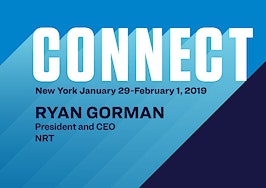For Joe Rand, real estate is a family business — and it’s safe to say that Rand’s family has been pretty successful at it. He’s the managing partner and general counsel for a thriving Better Homes & Gardens Real Estate empire in New York’s Hudson Valley, and he’s been willing to share his knowledge on stage, through articles and, most recently, a book deal.
Rand is going to be discussing how agents can differentiate themselves in the new market at Inman Connect New York, January 29 through February 1 at the Marriott Marquis Times Square. We talked to him about why it’s critical to be excellent at what you do and what happens if your business development program starts working a little too well.
Tell us a little more about your session. How will it address how the industry can embrace the shifting market?
My basic approach to all of this is that if you’re really great at your job, then all sorts of good things happen to you, which includes that you become a little bit — I don’t want to say recession-proof, but you’re going to get hurt less than other people will if you have a base of competence in what you do. In this business we get focused on the flash, “this person’s really good at marketing themselves, at prospecting,” and then under the hood there’s nothing there. They’re just not good at the job. I don’t know any good doctors who starve, I don’t know any good lawyers who don’t have business. I don’t know anybody who’s really a great hairstylist and their chair is empty half the time. If you’re good at your job, your clients love you and your deals close, and you read buyers’ needs and find them the right house.
The thing to focus on when the market starts to change: Make sure you’re firing off on the fundamentals and taking care of the clients you have, and don’t worry about the market. You’re worrying about something you can’t control; what you can control is becoming a better marketer, a better negotiator, better at coaching clients, managing transactions so that deals don’t fall apart. If you focus on the actual work that you do for your clients, then you’re going to fine. We see the profession expand during the good years and contract during the bad years. And I don’t think this is a bad market; the market’s fine, but if someone is used to the fact that you put a house on the market and it sells in five days, the rest of us know that wasn’t really normal. It’s not a “gimme” market, and it’ll wash away a lot of the pretenders, but it’ll really hurt a lot of these alternative business models. It’s easier to make a splash with a discount brokerage in a market that’s really hot, but a lot of these discount brokers have never had to hold onto a listing for six or seven months. When the market turns, it really does shake out a lot of the lower performers. If you’re doing a great job, you’ll be the people who make it on the other side.
What do you think are the biggest opportunities to focus on in the real estate industry right now?
I can remember 12 years ago during a relatively hot market, my wife was working in the business and doing a very sphere-focused marketing program, reaching out and providing them services, hoping that they would generate referrals for her, and she was very successful at it. One summer she was talking about how busy she was, and she said she hadn’t had any opportunity to call the people in her sphere and do the normal cultivation activity, and I said “Well, you can do it next month.” The normal impulse is that when something works, it works well and you get busy and you stop doing the thing that worked in the first place.
There are only two reasons agents stop doing a business development program. The first is that it doesn’t work, the second is that it does. If it doesn’t work right away, they lose faith and stop doing it. If it does work, they get busy and stop doing the things that got them busy in the first place. That’s where you have to look back and go “I’ve got a little bit of free time.” A lot of people are in markets that are relatively seasonal, so January, February and March are great times to do some maintenance on your business.
Everything I do in my teaching program focuses on expanding your idea of who your client is. Stop thinking about your clients as people who are buying and selling right now and start thinking about them as people who need real estate services all the time. People want and need real estate services — you just need to be willing to provide them when they’re not paying you with the anticipation that eventually they’re going to sell and reach out to you, or know somebody who’s buying or selling and referring them to you. The currency with which they pay you back is referrals or repeat business. It’s a long-term strategy, and if you do it correctly, it pays dividends the rest of your career. You’ll go into 2023 with a predictable base of X number of deals that you know from experience will come out of your sphere. But if you’re living deal to deal to deal, or lead to lead to lead, you don’t have that predictability. Or else you have to pay for those leads. Then if the market does change on you, you’ve gotten out of the habit of doing the things that maintain your base of deals.
To stay competitive, agents, brokers and companies need to execute quickly. What do you feel are key areas where quick execution can vastly improve the customer experience?
The challenge when you’re a real estate agent is that the hardest parts of the transaction are generally outside of your control. You can take a buyer out and they’ll have the greatest experience with you; they don’t waste six months of their time looking around — you did everything correctly, and you negotiate the deal and they feel great about you, you get them through the inspection and negotiate a little bit of savings, and everything’s going great, and they get into contract … and now it’s in the hands of the escrow company or the lawyers, and then they have to go get the mortgage and everything goes into the dumpster.
The mortgage experience is the black hole of client experience in this industry. Clients are really happy during the process when they work with agents on the buy side, then it all turns into a nightmare, and that tends to cloud their memory of how happy they were working with their agent, and a lot of that is outside the agent’s control. There’s really only a couple of things you can do to make that experience easier. One is to exercise some influence to help them work with the best possible loan officer you know, who is not only competent but you can wield some influence over them yourself, so you can call them. And you’ve got to quarterback that deal and stay on top of it. Whether you know that loan officer or not, you should be making phone calls to juice that deal along. And you’ve got to prepare your clients for that process. Sit them down and say “everything’s been fine so far, but now we’re going to start the mortgage process, and this is going to be difficult. Here are the things that will be very frustrating for you, so don’t freak out when it happens.” That’s normal, that’s the way mortgages work all the time, and if they’re prepared for it, it’s a lot less painful than if you’ve been sugar-coating it the whole time. If their expectations are set to think that the mortgage and title process are difficult, they feel really prepared and they still feel good about you.
On the list side, you have that same conversation, but the thing about sellers is the experience is pretty front-loaded — there are a lot of painful things they have to do with pricing and staging, so it’s important to manage their expectations about what it’s like to clean their house up and have buyers traipsing through their house at all hours. Transaction management with sellers is less important. The thing I’ve learned after all these years of teaching about client services — we think about it as services, but I tend to think about it as client experience. You can deliver a great service, but if they didn’t feel it then it didn’t happen.
An example: I go into a clothing store one day and I’m just kind of browsing, and the salesperson comes up and says “can I help you,” and I feel like she’s putting pressure on me and hovering and I want to be left alone – that’s a bad service experience. But if a week later I spill something on my tie and she comes up and gets me a tie and I’m out of there in five minutes, it was the same service but it was a totally different experience because of what I brought to the table. That’s what great service comes from, is being responsive to the needs of the client in the moment and managing the expectations of that client, so you’re managing their needs throughout the process, and they’re not expecting what you can give them.
What are your hopes for the next 12 months, and what will you be working on?
I’ve got to finish this second book, out in January, so a lot of what I’ll be doing next year on a fundamental level is talking a lot about my book and incorporating it into a whole training program that I want to develop. Speaking more globally, and sort of at a more abstract level, I think that 2019 is a year to separate yourself from the rest of the business. I think there will be opportunities. We’ve had a couple of years where the story, and all the initiative and velocity, has been with a lot of these newcomers to the industry, and I wonder whether or not with the changing of the market, we see a reassertion of some traditional business models, of some agents who are successful, brokerages are successful, but nobody ever talks about them.
I think there are companies like Howard Hanna, that don’t have venture capital (VC) money, aren’t sexy, aren’t frontlining conferences, but they sell a lot of houses, and as the market changes, they’re really well-positioned. They don’t have any debt, they have solid people, they’re working in markets where there hasn’t been a lot of penetration. And a lot of these VC-funded companies, the idea was let’s grow, cash out and go public. Well, when the stock market loses 600 points every day, the idea of there being a quick cashout becomes a little bit more problematic and you wonder whether some of these venture capitalists are looking at the companies and wondering when they’re going to get out of growth mode and start making a profit.
Discover the opportunities in a changing market at Inman Connect New York, January 29 – February 1. Jumpstart 2019 with tactical takeaways, unlimited networking and thought-provoking speakers. Learn more.
Thinking about bringing your team? You may qualify for special group perks! Contact us to learn more.















